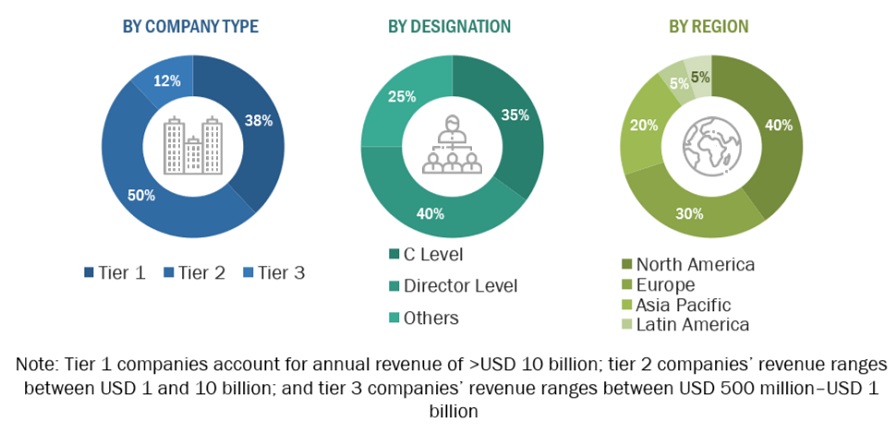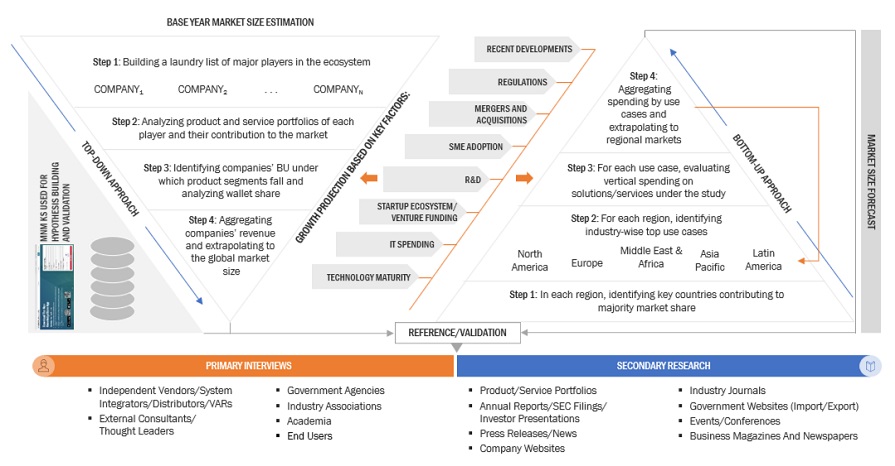The AI Studio market research study involved extensive secondary sources, directories, journals, and paid databases. Primary sources were mainly industry experts from the core and related industries, preferred AI Studio providers, third-party service providers, consulting service providers, end users, and other commercial enterprises. In-depth interviews were conducted with various primary respondents, including key industry participants and subject matter experts, to obtain and verify critical qualitative and quantitative information, and assess the market’s prospects.
Secondary Research
In the secondary research process, various sources were referred to, for identifying and collecting information for this study. Secondary sources included annual reports, press releases, and investor presentations of companies; white papers, journals, and certified publications; and articles from recognized authors, directories, and databases. The data was also collected from other secondary sources, such as journals, government websites, blogs, and vendors' websites. Additionally, AI Studio spending of various countries was extracted from the respective sources. Secondary research was mainly used to obtain key information related to the industry’s value chain and supply chain to identify key players based on software, services, market classification, and segmentation according to offerings of major players, industry trends related to software, deployment mode, user interface, services, data modality, application, vertical, and regions, and key developments from both market- and technology-oriented perspectives.
Primary Research
In the primary research process, various primary sources from both the supply and demand sides were interviewed to obtain qualitative and quantitative information on the market. The primary sources from the supply side included various industry experts, including Chief Experience Officers (CXOs); Vice Presidents (VPs); directors from business development, marketing, and AI Studio expertise; related key executives from AI Studio solution vendors, SIs, professional service providers, and industry associations; and key opinion leaders.
Primary interviews were conducted to gather insights, such as market statistics, revenue data collected from software and services, market breakups, market size estimations, market forecasts, and data triangulation. Primary research also helped understand various trends related to technologies, applications, deployments, and regions. Stakeholders from the demand side, such as Chief Information Officers (CIOs), Chief Technology Officers (CTOs), Chief Strategy Officers (CSOs), and end users using AI Studio solutions, were interviewed to understand the buyer’s perspective on suppliers, products, service providers, and their current usage of AI Studio software and services, which would impact the overall AI Studio market.
The Breakup of Primary Research:

To know about the assumptions considered for the study, download the pdf brochure
Market Size Estimation
In the bottom-up approach, the adoption rate of AI Studio solutions and services among different end users in key countries concerning their regions contributing the most to the market share was identified. For cross-validation, the adoption of AI Studio solutions and services among industries and different use cases concerning their regions was identified and extrapolated. Weightage was given to use cases identified in different regions for the market size calculation.
Based on the market numbers, the regional split was determined by primary and secondary sources. The procedure included the analysis of the AI Studio market’s regional penetration. Based on secondary research, the regional spending on Information and Communications Technology (ICT), socio-economic analysis of each country, strategic vendor analysis of major AI Studio providers, and organic and inorganic business development activities of regional and global players were estimated. With the data triangulation procedure and data validation through primaries, the exact values of the overall AI Studio market size and segments’ size were determined and confirmed using the study.
Global AI Studio Market Size: Bottom-Up and Top-Down Approach

Data Triangulation
Based on the market numbers, the regional split was determined by primary and secondary sources. The procedure included the analysis of the AI Studio market’s regional penetration. Based on secondary research, the regional spending on Information and Communications Technology (ICT), socio-economic analysis of each country, strategic vendor analysis of major AI Studio providers, and organic and inorganic business development activities of regional and global players were estimated. With the data triangulation procedure and data validation through primaries, the exact values of the overall AI Studio market size and segments’ size were determined and confirmed using the study.
Market Definition
AI Studio is an innovative artificial intelligence tool designed to enable users to create and operate complex intelligent systems without writing a single line of code. With AI Studio, creating intelligent systems becomes accessible and efficient for everyone, without requiring deep technical knowledge. AI Studio software encompasses a range of tools and platforms that utilize AI algorithms to automate tasks, enhance efficiency, and improve outcomes in various domains, such as video editing, software development, and enterprise operations. AI Studio software increasingly integrates with cloud platforms such as AWS, Azure, and Google Cloud to leverage scalable computing resources and facilitate easy deployment and management of AI models. The AI Studio software is characterized by trends such as the integration of machine learning, natural language processing (NLP), and generative AI technologies to enable advanced functionalities like automated editing workflows, personalized content creation, and enhanced productivity for developers.
Stakeholders
-
Application design and software developers
-
AI Studio vendors
-
Business analysts
-
Cloud service providers
-
Consulting service providers
-
Business owners
-
Distributors and Value-added Resellers (VARs)
-
Government agencies
-
Independent Software Vendors (ISV)
-
Managed service providers
-
Market research and consulting firms
-
Support & maintenance service providers
-
System Integrators (SIs)/migration service providers
-
OEMs
-
Technology providers
Report Objectives
-
To define, describe, and predict the AI Studio market by offering (software [by type, deployment mode, and user interface] and services), data modality, application, vertical, and region
-
To provide detailed information related to major factors (drivers, restraints, opportunities, and industry-specific challenges) influencing the market growth
-
To analyze the micro markets with respect to individual growth trends, prospects, and their contributions to the total market
-
To analyze the opportunities in the market for stakeholders by identifying the high-growth segments of the AI Studio market
-
To analyze opportunities in the market and provide details of the competitive landscape for stakeholders and market leaders
-
To forecast the market size of five main regions: North America, Europe, Asia Pacific, the Middle East & Africa, and Latin America
-
To profile key players and comprehensively analyze their market rankings and core competencies
-
To analyze competitive developments, such as partnerships, new product launches, and mergers & acquisitions, in the AI Studio market
-
To analyze the impact of the recession across all regions in the AI Studio market
Available Customizations
With the given market data, MarketsandMarkets offers customizations as per your company’s specific needs. The following customization options are available for the report:
Product Analysis
-
Product quadrant, which gives a detailed comparison of the product portfolio of each company.
Geographic Analysis
-
Further breakup of the North American AI Studio market
-
Further breakup of the European AI Studio market
-
Further breakup of the Asia Pacific AI Studio market
-
Further breakup of the Middle Eastern & African AI Studio market
-
Further breakup of the Latin America AI Studio market
Company Information
-
Detailed analysis and profiling of additional market players (up to five)



Growth opportunities and latent adjacency in AI Studio Market